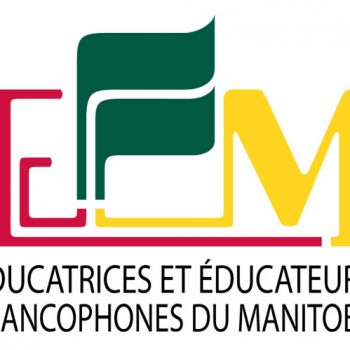Francophone teachers in Manitoba
In Manitoba, an association known as Éducatrices et éducateurs francophones du Manitoba or ÉFM was created over 47 years ago, as an agency of The Manitoba Teachers’ Society.
Its mandate is to work in the area of French-language education in Manitoba and, more specifically, in professional development. The association has over 1,865 members in 136 schools throughout the province. Its members come either from the French-as-a-first-language or French-immersion education systems. In total, they represent about 12% of Manitoba teachers.
Board of Directors
The Conseil des écoles
One feature of the ÉFM is its Conseil des écoles (school council). Every school that is a member of ÉFM chooses a representative to take part in the three meetings held by the Conseil each year. The purpose of these meetings is to provide an update on ÉFM’s activities and to present resources and services offered to members. The meetings also give representatives an opportunity to network and find out what other schools are doing in the province. For ÉFM, they are a way to take the pulse of members throughout the school year and to inform them of current issues in education.
For example, in May 2015, the Conseil des écoles met at the Centre culturel franco-manitobain (CCFM) to celebrate the launch of the new arts education curriculum, which was produced by the Bureau de l’éducation française. At the event, participants were able to visit the Cercle Molière’s facilities and to attend presentations by cultural organizations such as CCFM, Le 100 NONS, and Freeze Frame, in addition to an extract from a play called “Zô”.
Conseil des écoles (School Council)
Regional learning networks
ÉFM membership is spread throughout the large province of Manitoba, and some members live in remote areas. For various reasons including distance, travelling time and cost, it is difficult for them to access professional training.
Also, these teachers often work in schools where only a few teach in French. Sometimes, they may even be the only ones!
For all these reasons, ÉFM has launched regional learning networks known as RARs (acronym for Réseaux d’apprentissage régionaux). These networks can be formed by teachers from at least two schools who want to develop and maintain professional relations among colleagues in the region. Funding is available for them if they want to meet, talk about their needs and challenges, and potentially set up a professional development activity in their area.
Sometimes, RARs also develop community-based cultural activities. Last year, teachers from the Thompson RAR decided to organize a French-language movie day for families on a Saturday. Activities in French are extremely rare, or non-existent, in that area, and so the need for this type of event is great.
Teacher grant program
On another note, ÉFM offers a grant program to teacher members so they can access professional development opportunities. Members need to apply to receive financial assistance.
Also, members can apply for funds in support of a community activity promoting French-language education. For example, the activity can be a pancake breakfast as part of the Festival du Voyageur — a celebration of Manitoba’s French culture and history — or a day of activities to celebrate French culture with a visit by an artist at school. This kind of financial support helps ÉFM members to pursue their professional quest and to act as French cultural agents in their school.
Committees
ÉFM has five committees mandated to set up initiatives and services for members:
-
The Comité de vie professionnelle (work life committee), which focuses on professional development services and helps ÉFM identify teacher needs;
-
The Comité de sensibilisation et de promotion de l’éducation en français (French-language education promotion committee), whose role is to promote ÉFM with members and the community, to enhance the status of the teaching profession and to increase the school community’s awareness of major issues related to French-language education in Manitoba;
-
The Comité des communications (communications committee), which oversees ÉFM’s publication called Inform-Action, and manages the organization’s social networks and website;
-
The Comité d’équité et de justice sociale (social justice and equity committee), whose mandate is to raise the school community’s awareness of important equity and social justice issues, and to defend related values;
-
The Comité organisateur de la conférence pédagogique annuelle (annual teacher conference organizing committee), whose task is to organize one of the most important events of this sort outside Quebec, with more than 625 delegates. The conference program includes some 40 workshops facilitated by several ÉFM members as well as external presenters.
These committees are composed of ÉFM members who each bring their own perspective and experience. This guarantees that projects and initiatives fulfill real needs in the education community.




